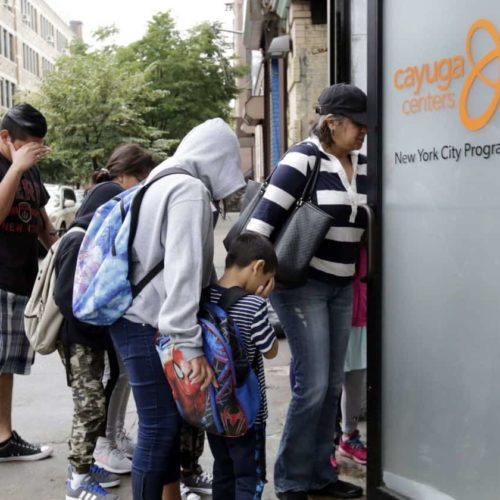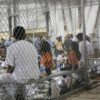Introduction
The tiny children arrived in Michigan from the U.S.-Mexico border after plane rides with strangers.
They arrived without paperwork that would indicate where their parents were held in detention. Some of them even arrived without information as basic as their parents’ names.
Many of the children, among them a 3-month-old baby, are so young that they have no words — in any language — to help their American custodians find parents separated from them over the last month or so.
The parents were immediately put into adult detention as part of the Trump administration’s “zero tolerance” policy, an experiment to staunch migration from Central America.
Outcry, though, has been swift and fierce. And on Wednesday, President Donald Trump signed an executive order ending family separation, a crisis that the “zero tolerance” policy, which requires prosecution of all undocumented border crossers, created.
But now the reversal leaves case managers for the migrant children in Michigan and other states scrambling to find where parents are held, so families can be reunited possibly either in family detention for periods of time, or released with court dates if the parents are trying to apply for asylum.
“The separation has been horrific, and you cannot change that now,” said an upset Agustin Arbulu, executive director of the Michigan Department of Civil Rights.
Now the new “nightmare” is to find the parents, he said, but there is no central clearinghouse for information coordinated by federal agencies.
“At the national level, how can you not have some sort of database?” he asked incredulously.
“We have to talk this through, and not simply separate children for national security interests,” Arbulu said. “My job is really to bring this to the attention of the federal authorities, to put more information out there so we can come up with better alternatives to this horrific situation.”
Beginning in early May, about 2,300 children were separated from their parents as they crossed the border unlawfully, often turning themselves in voluntarily to Customs and Border Patrol agents. The children had to be separated so that the Trump administration could immediately jail and prosecute all border crossers, even those facing a first-time misdemeanor offense of illegal entry.
The children have been sent to states scattered around the country. In New York City, media discovered young children being escorted into a shelter this week, upsetting Mayor Bill de Blasio, who had no idea that more than 200 migrant children are being cared for by the New York organization.
In Michigan, Arbulu said the Grand Rapids-based organization Bethany Christian Services has more than 80 children in its care currently.
About 54 of the children are in “transitional” Bethany foster care after separation from parents at the border. The average age of children under the group’s care last year was 12, and now that average age is 7 years.
“When they arrive, they have papers with a name, gender, a country of origin and place of separation — such as ‘El Paso, Texas,’” Arbulu said.
To his shock, he’s been told by case managers that sometimes the children’s parents’ names haven’t been on paperwork.
To try to find parents now, he said, case managers have resorted to calling detention centers, one by one, starting with those that are in the region where they were separated. Adult immigration detainees can also be shipped out to other parts of the country for detention so there is no guarantee that parents are still in the border areas where they were taken into custody.
On Friday, federal authorities said they had reunited about 500 children with their parents nationwide.
There’s no question of how traumatizing this policy has been for children, Arbulu said.
Beyond that, he said that there appeared to be no effective coordination between the Department of Homeland Security and the Department of Health and Human Services, which takes custody of “unaccompanied minors” found crossing the border.
HHS, which takes charge after Customs and Border Protection agents hand children over, did not return requests to answer questions.
Over the last decade, the numbers of Central American and Mexican children, mostly teens, who have crossed the border on their own have grown as gang violence grips the region. Many minors facing recruitment or death threats have tried to cross so they could find refuge and live with a parent or relative residing in the United States.
Children recently separated from parents at the border were all classified as “unaccompanied minors,” although they didn’t enter the United States on their own.
“This action has ramifications that will affect these children for the long-term,” Arbulu said. “I was told there was a 3-month-old child among them [in Michigan].” He said other infants might also be in Bethany’s care, along with toddlers and very young children.
The group did not return a call for comment, but said it was overwhelmed with requests for interviews and pointed to its website for information on its position on migration and children.
Ask us your Immigration Decoded questions
READ MORE:
Trump blamed Democrats for ‘horrible’ bipartisan child migrant law. Here’s its purpose
Jeff Sessions’ latest border plan clashes with legal and economic realities
Trump’s TPS cancellations could lead more than 300,000 to become undocumented
Read more in Inequality, Opportunity and Poverty
Immigration Decoded
Commentary: Trump’s immigration blame game
Migrants have long assumed costs, risks of border crossing—but Trump’s finger pointing now adds to the burden.
Immigration Decoded
ICE failed to penalize contract immigrant jails with thousands of safety and rights violations
Federal watchdog says contractors failed to report sexual assaults and staff misconduct to ICE investigators.



Join the conversation
Show Comments